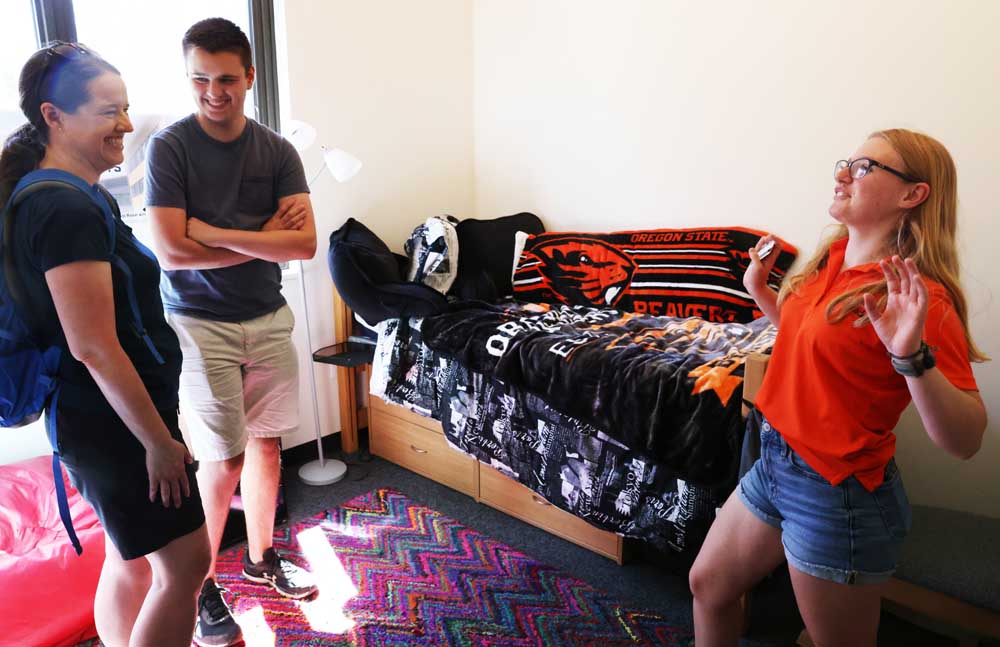OSU-Cascades says program helps first-generation, low income students
Published 5:00 am Thursday, August 11, 2022

- Ashlynn Bagwig, right, shows a residence hall room to prospective student Weston Long and his mother, Nicola, of Portland, during a tour of the Oregon State University-Cascades campus in Bend on Wednesday.
Kylee Linnell always pictured herself going to college, but the 19-year-old’s journey to Oregon State University-Cascades in Bend was marked repeatedly by struggle.
Linnell, who will be a sophomore in the fall, came to the campus in 2021 after being accepted into the college’s TRIO program, which provides counseling and guidance to low-income, first-generation students and students with disabilities.
The federally funded program, named for the three original programs that received funding from the Higher Education Act, helps students navigate financial aid, write cover letters and resumes, email professors and more.
In its first year serving students in-person since it started on the Bend campus in the fall of 2020, the program, college officials said, became essential for retaining vulnerable students like Linnell as interest in higher education plummeted due to the coronavirus pandemic.
The pandemic made it harder for some students to access on-campus resources for help, college officials said. That reality was especially hard for students like those in the TRIO program, some of whom lack the reliable internet access, financial stability and child care to continue pursuing higher education.
“Online school was rough,” said Cassie Copeland, an assistant director and academic counselor for the TRIO program. She added: “They were just not getting as much out of it and were like: Why am I still paying this much money for college if I’m getting half the experience?”
Jane Reynolds, the executive director of enrollment management for OSU-Cascades, said the college saw “huge” gaps in the number of first-generation college students staying enrolled during the pandemic.
But with roughly 130 students in the TRIO program this past academic year, the college saw student retention — the rate at which students remain enrolled year after year — improve to upwards of 94%, as of March.
In addition, early data from the program suggests that students who were involved performed better academically, with nearly all students remaining in good academic standing — a grade point average of at least 2.0 — at the end of the 2020-2021 school year.
Those trends bode well for the program, which needs to have student retention rates of 73% and 78% of students in good academic standing to continue receiving federal grant funds that support the program, Copeland said. The grants amount to more than $261,000 per year for five years.
Students who take part in the program take a weekly two-credit course in the fall that helps them navigate the basics of college: meeting professors, scheduling and navigating classes, deciding on degree paths, understanding student loans and finances, building cover letters and resumes and applying for jobs. After that, students meet with counselors like Copeland once per term, but they can also choose to meet and receive help as much as they need.
Last year, Copeland said students in the TRIO program obtained internships, teaching assistant positions and research opportunities through the college. Copeland said at least seven students also received a Ford Family Foundation scholarship, which covers roughly 90% of a student’s unmet college costs, depending on the student’s other grants and scholarships.
Among the students who found help through the program is Linnell, who said she didn’t have the struggles most first-generation college students face “because I had TRIO.”
“Who knows where I’d be without that?” Linnell said of the TRIO program. “I’d be completely lost.”
In high school, Linnell moved out of her house after a series of family blowouts sparked by her father’s struggles with alcoholism. At 15, she couch surfed for a while before moving in with her grandmother in Grants Pass. Each day, she drove from the small Southern Oregon town to her school in Phoenix, nearly 40 minutes away. While her mother worked nights at the local Fred Meyer, Linnell became financially independent, supporting herself with a job at a concession stand at a local baseball field and paying for gas with quarters.
“I was terribly depressed,” Linnell said.
But when a fire tore through the town of Phoenix, destroying homes in September 2020, Linnell found a new drive to help people. She made donations, organized food drives and helped inform community members about available housing. But that was only the beginning. She started working with local nonprofit organizations. She worked for a program where disabled children ride horses. She even became involved with voter registration in the November 2020 election.
Linnell brought those interests to OSU-Cascades, but like other first-generation college students, she was shy, didn’t know anyone and quickly became overwhelmed by the mountains of documentation that college requires. During her first term, she fell behind in her coursework and was fearing failure.
But Copeland helped Linnell, encouraging her to work with professors and helping her access federal relief funds.
In her first year on campus, she became involved with the rock climbing club, art club, business club, sustainability club, equestrian club, the sexuality and gender alliance and a river cleanup group.
Now, she wants to use her connections through TRIO to finish college early so she can study abroad — twice.






